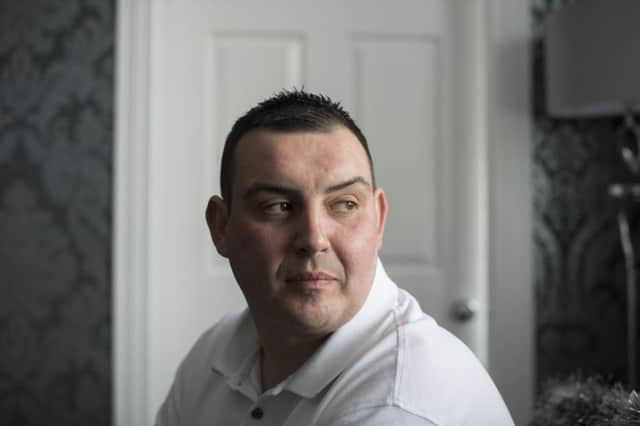Glasgow research gives hope in a heartbeat


Gerry Duff, felt breathless at work on a Wednesday, but didn’t think much of his symptoms but by Friday – after a night in his local bar – he was in a critical condition.
The 31-year-old, who had no previous health problems, was diagnosed with chronic heart failure, with doctors draining four litres of fluid that had leaked into his lungs – a common symptom of the condition.
Advertisement
Hide AdAdvertisement
Hide AdWhile in Glasgow’s Queen Elizabeth University Hospital, he was asked if he would take part in a pilot project to trial a new device for 500 Scottish patients that involved a doctor injecting a tiny monitor, no bigger than the lid of a Biro, into his chest.
Duff agreed and will now be monitored over the course of the next three years by Professor Roy Gardner and his team at the British Heart Foundation Centre of Research Excellence in Glasgow and the Golden Jubilee National Hospital. After that doctors have told him the monitor can stay in his body as it’s so small and won’t cause him any harm. Duff has been told he will make a full recovery.
He said: “It came to Friday and I went for a pint after work. I stay two minutes from the pub and by the time I’d walked back to my house I couldn’t breathe. I remember trying to lie back and go to sleep but I still couldn’t get my breath. I then called my mother and father – they sent me straight to the hospital.
“I was given a chest scan straight away and it showed up that I had fluid in my lungs that was causing my breathlessness. I think that’s the first symptom of heart failure – the heart stops pumping as fast and all the fluid can’t be pumped through the body as quick, which then causes your lungs to fill up.
Around 48,000 people in Scotland are living with heart failure, a debilitating incurable condition. Most commonly, heart failure is caused by a heart attack which causes damage to the heart muscle that can never be repaired.
Dr Simon Beggs, who treated Duff, said: “ Heart failure is a major diagnosis, but thankfully Gerry is benefiting from the excellent treatments available.”
He added: “The aim of our study is to understand the role of abnormal heart rhythms in people with heart failure.
“We ask people admitted to hospital with heart failure in Glasgow to have a tiny heart monitor injected under the skin of the chest.
Advertisement
Hide AdAdvertisement
Hide Ad“The monitors transmit the heart rhythm data back to us via a mobile phone app, making this real 21st century research. We hope that our findings will help us take a major step forward in the fight against heart failure.”